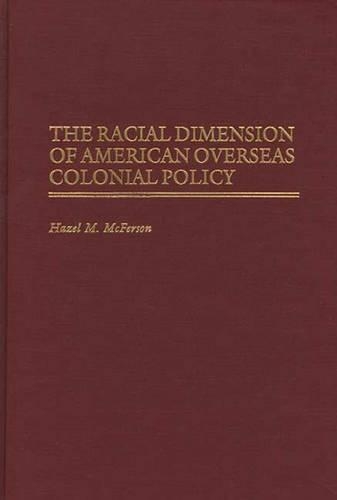
The Racial Dimension of American Overseas Colonial Policy
(Hardback)
Publishing Details
The Racial Dimension of American Overseas Colonial Policy
By (Author) Hazel McFerson
Bloomsbury Publishing PLC
Praeger Publishers Inc
23rd September 1997
United States
Classifications
Tertiary Education
Non Fiction
Colonialism and imperialism
National liberation and independence
Social discrimination and social justice
Ethnic studies / Ethnicity
History of the Americas
Racism and racial discrimination / Anti-racism
325.373
Physical Properties
Hardback
208
Description
Beginning in 1898, the United States won overseas colonies as the spoils of the Spanish-American War: Puerto Rico, the Philippines, and Cuba. Guam and Hawaii were also acquired in that year, and in 1917, the Danish Antilles became the United States Virgin Islands. The racial heritage of the territorial inhabitants paralled that of nonwhite groups in the United States: Native Americans, Africans, Asians, Hispanics, and mixed-race people. The nonwhite race of domestic and overseas colonial people established important links between American domestic racial policies and the racial policies and the racial dimension of American overseas colonies. This book is about these links, as shaped by the prevailing racial tradition and social structure in the United States itself. Crucial to examining these links is the little-known role of Booker T. Washington in shaping American overseas colonial policy. It is argued that following colonial acquisition at the turn of the century, the American racial tradition was exported to overseas territories, thereby largely determining colonial policy and administrative practices, the nature of social and racial conflict, and the direction and pace of political evolution in the territories.
Reviews
[M]cFerson has written an attractive book that is methodologically interesting, intellectually provocative, and of the right proportions to serve as a useful text for students in several social science disciplines.-Political Science Quarterly
Hazel M. McFerson's study is a welcome addition....McFerson makes a persuasive argument that the consolidation of white supremacist ideas in American life over the course of the nineteenth century was a critical determinant of the manner in which the colonies in the Caribbean and the Pacific were acquired and administered by the United States.-The International History Review
"McFerson has written an attractive book that is methodologically interesting, intellectually provocative, and of the right proportions to serve as a useful text for students in several social science disciplines."-Political Science Quarterly
"[M]cFerson has written an attractive book that is methodologically interesting, intellectually provocative, and of the right proportions to serve as a useful text for students in several social science disciplines."-Political Science Quarterly
"Hazel M. McFerson's study is a welcome addition....McFerson makes a persuasive argument that the consolidation of white supremacist ideas in American life over the course of the nineteenth century was a critical determinant of the manner in which the colonies in the Caribbean and the Pacific were acquired and administered by the United States."-The International History Review
Author Bio
HAZEL M. MCFERSON is Associate Professor in the Department of Public and International Affairs, and Associate at the Institute for Conflict Analysis and Resolution at George Mason University.
